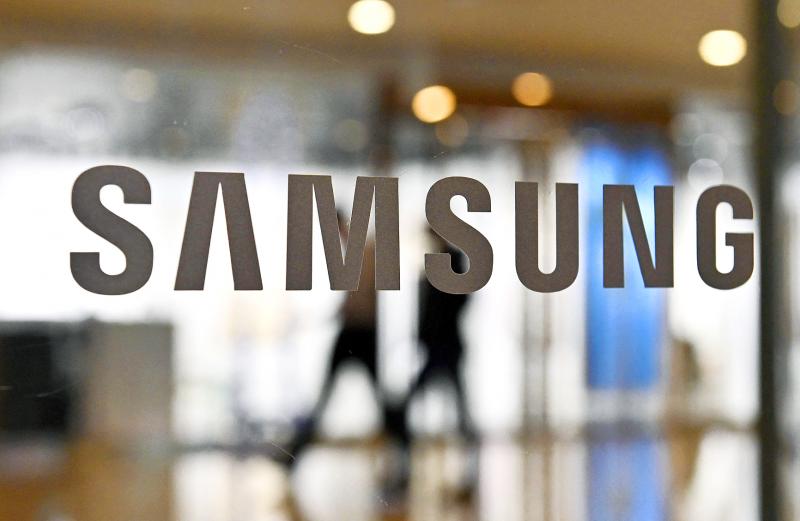Samsung Electronics Co’s quarterly profit climbed more than 50 percent after chip prices stabilized and sales of smartphones surged, reinforcing hopes that the memory industry can emerge from its downturn.
South Korea’s largest company posted operating income of 13.8 trillion won (US$11.46 billion) for the quarter ending last month, missing estimates after it distributed special bonuses to employees.
However, revenue jumped a better-than-expected 23 percent to 76 trillion won. The company’s stock climbed as much as 2 percent in morning trading in Seoul.

Photo: AFP
Samsung and rivals SK Hynix Inc and Micron Technology Inc are weathering a cyclical downturn, helped by demand from servers as well as a widening array of products from vehicles to home devices. Micron last month predicted record revenue for this year thanks to resilient demand from data centers, networking and automobile customers.
Investors are also monitoring Samsung’s operation in the central Chinese city of Xian, a big Micron production center, which has been locked down while the government fights a local COVID-19 outbreak. While it is unclear how long that situation might persist, analysts said that short-term disruptions could dampen supply and lift chip prices. Samsung is to provide net income and divisional performance when it reports its full earnings on Jan. 27.
“Memory prices will rebound in the second quarter if the lockdown in Xian gets prolonged,” Nomura Financial Investment head of Asia technology C.W. Chung said. “Demand from servers is solid, while PC demand is better than the market feared.”
Samsung’s 1.4 trillion won fourth quarter operating estimate miss could be partly due to a one-time incentive payment coupled with the Xian lockdown, Bloomberg analyst Masahiro Wakasugi said, adding that weakening memory chip prices could also affect its profit in the first quarter this year.
Samsung’s foundry business, fabricating semiconductors for the likes of Nvidia Corp, is also making a growing contribution to its bottom line, after the global chip shortage boosted prices for system chips.
Micron reported strong demand for chips used in data centers and industrial machinery last month, and also noted that the improving supply of other components is helping PC makers build more machines, supporting memory demand. Price drops in the fourth quarter were less dramatic than anticipated, with DRAM down about 5 percent and NAND dropping 3 percent, Hanwha Investment & Securities said.
Analysts had projected the industry downturn to persist through the first half of this year, with double-digit drops for both memory classes. Sentiment changed after China imposed its Xian lockdown, affecting production for Samsung and Micron’s local facilities.
Samsung’s Xian plant capacity accounts for about 15 percent of global NAND flash output, Hana Financial Investment said.
Samsung has not completely shut down the fab, but has adjusted operations.
“The NAND flash market may not enter an oversupply situation and is likely to keep the supply-demand balance for six months,” Hana Financial Investment analyst Claire Kim said in a note.

Intel Corp chief executive officer Lip-Bu Tan (陳立武) is expected to meet with Taiwanese suppliers next month in conjunction with the opening of the Computex Taipei trade show, supply chain sources said on Monday. The visit, the first for Tan to Taiwan since assuming his new post last month, would be aimed at enhancing Intel’s ties with suppliers in Taiwan as he attempts to help turn around the struggling US chipmaker, the sources said. Tan is to hold a banquet to celebrate Intel’s 40-year presence in Taiwan before Computex opens on May 20 and invite dozens of Taiwanese suppliers to exchange views

Application-specific integrated circuit designer Faraday Technology Corp (智原) yesterday said that although revenue this quarter would decline 30 percent from last quarter, it retained its full-year forecast of revenue growth of 100 percent. The company attributed the quarterly drop to a slowdown in customers’ production of chips using Faraday’s advanced packaging technology. The company is still confident about its revenue growth this year, given its strong “design-win” — or the projects it won to help customers design their chips, Faraday president Steve Wang (王國雍) told an online earnings conference. “The design-win this year is better than we expected. We believe we will win

Chizuko Kimura has become the first female sushi chef in the world to win a Michelin star, fulfilling a promise she made to her dying husband to continue his legacy. The 54-year-old Japanese chef regained the Michelin star her late husband, Shunei Kimura, won three years ago for their Sushi Shunei restaurant in Paris. For Shunei Kimura, the star was a dream come true. However, the joy was short-lived. He died from cancer just three months later in June 2022. He was 65. The following year, the restaurant in the heart of Montmartre lost its star rating. Chizuko Kimura insisted that the new star is still down

While China’s leaders use their economic and political might to fight US President Donald Trump’s trade war “to the end,” its army of social media soldiers are embarking on a more humorous campaign online. Trump’s tariff blitz has seen Washington and Beijing impose eye-watering duties on imports from the other, fanning a standoff between the economic superpowers that has sparked global recession fears and sent markets into a tailspin. Trump says his policy is a response to years of being “ripped off” by other countries and aims to bring manufacturing to the US, forcing companies to employ US workers. However, China’s online warriors